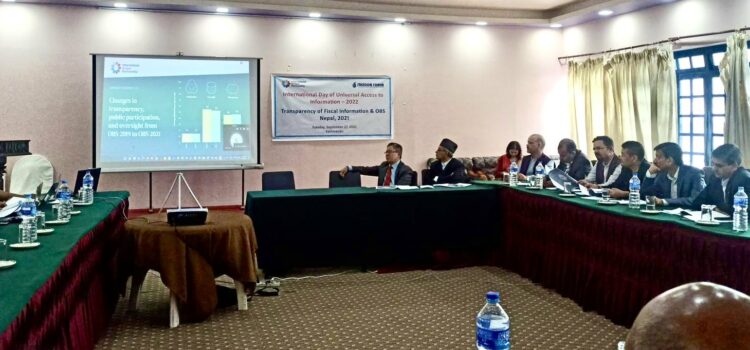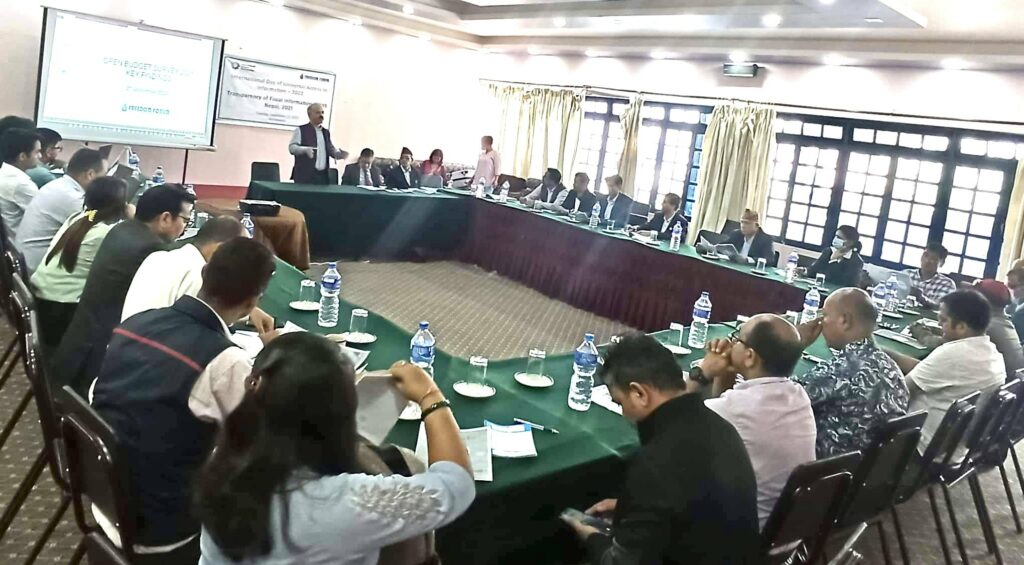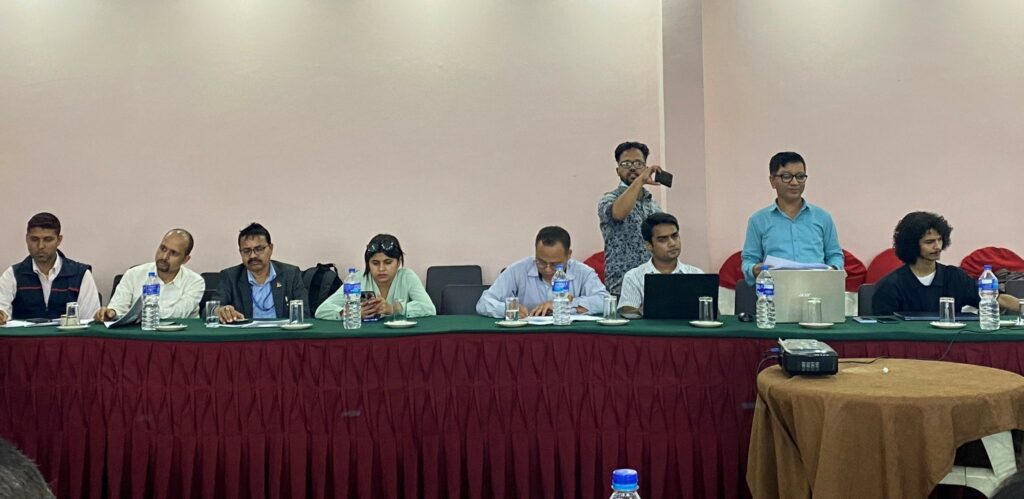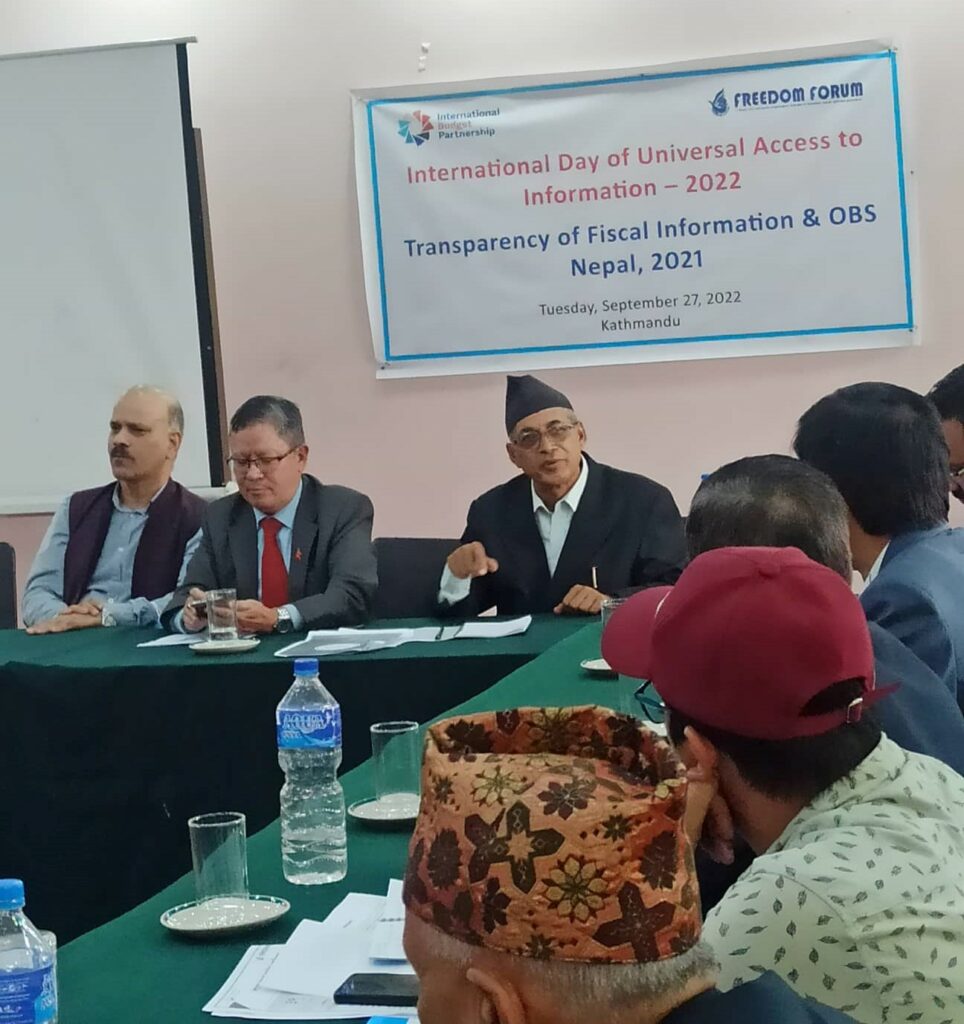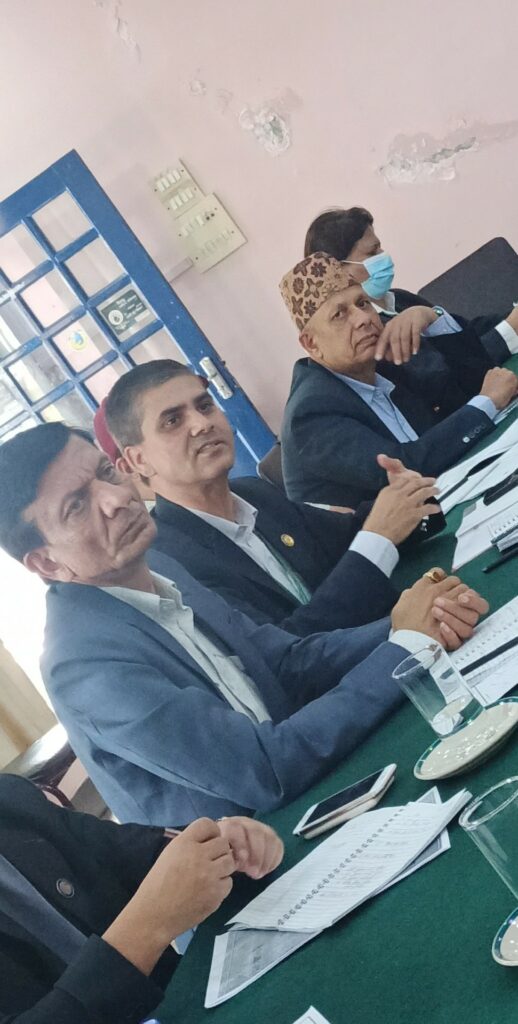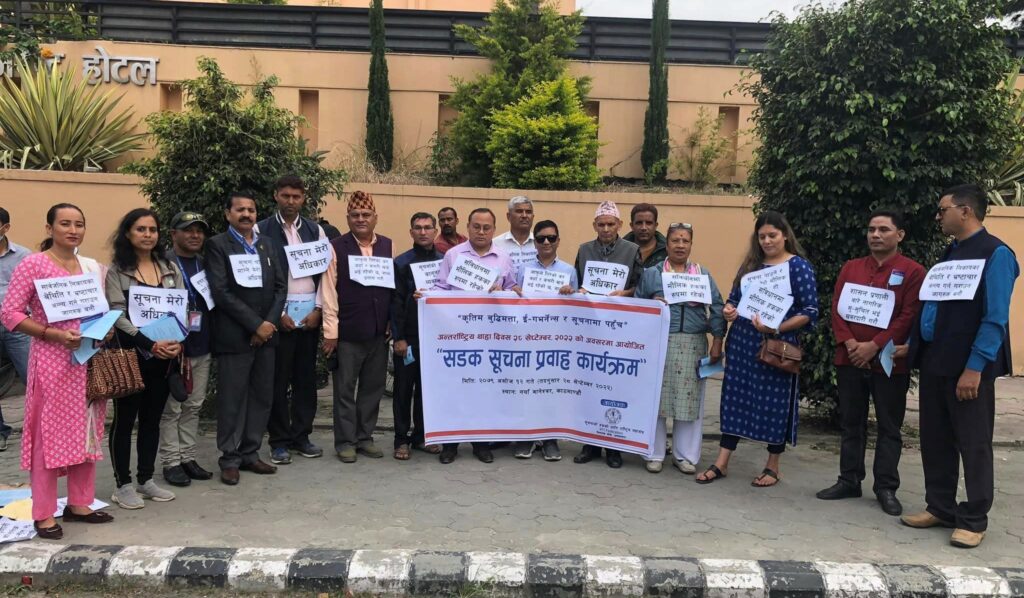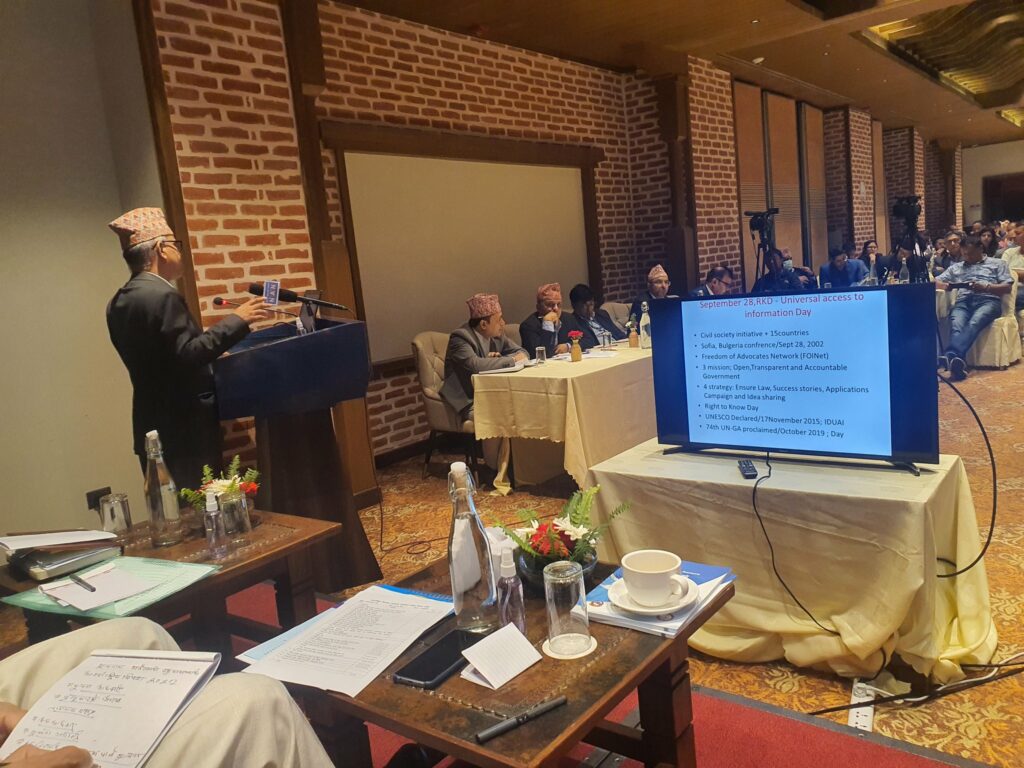On September 27, Freedom Forum in collaboration with the International Budget Partnership (IBP) organized a national-level program ‘Access to Fiscal Information and Dissemination of Open Budget Survey-2021 Findings’ gathering a wider spectrum of participation from the stakeholders.
Representatives from the concerned government agencies, parliament committee, Supreme Audit Institution, civil society organizations, media, individual champions and International Budget Partnership (IBP) had actively participated in the collaborative event.
Since 2009, Freedom Forum has been continuously working in partnership with the IBP- an international organization working across the globe on different dimensions of budget accountability.
On the occasion, the findings and recommendations of the OBS-2021 global, South Asian and Nepal’s reports were discussed. The biennial survey assesses public access to central government budget information among 120 countries. Three major aspects of open budgets: transparency of how public resources are raised and spent, opportunity for participation in budget policy decisions and oversight by legislatures and audit institutions were discussed.
IBP’s OBS Researcher Suad Hasan presented global findings sharing that since 2008 budget transparency scores had increased more than 20 percent. Among the top 10 performers in the 2021 round survey were Georgia, South Africa, Sweden, New Zealand, Mexico, Norway, Brazil, Australia, Dominican Republic and Italy, she highlighted.
“The top improvers in 2019-21 were the Gambia, Nigeria and Azerbaijan in the assessment of budget transparency; Georgia, Chile, Slovakia and Kenya on public participation and Zambia, Tunisia and Sri Lanka on oversight”, Suad further noted.
OBS Researcher for Nepal Krishna Sapkota shared the OBS 2021 Nepal report at the program. He said that Nepal scored 39 (out of 100) in budget transparency assessment which is below the global average of 45. Likewise, the country obtained 24 (out of 100) on citizen participation in the budget process and gained a composite score of 44 (out of 100) in the assessment of the strength of formal oversight institutions (legislatures and audit institutions), he noted.
With the score, Nepal gained third position in South Asia with Pakistan and Afghanistan securing first and second position with 46 and 43, respectively, Sapkota shared.
Various stakeholders on the occasion highlighted the need for inculcating values of open budgeting and access to information for systemic changes.
As a keynote speaker, Chief Information Commissioner Mahendra Man Gurung stressed the urgency for a wider level of advocacy on participatory formulation of fiscal policies and their implementations at all three tiers of the government. He urged the civil society organizations and media to further deepen the movement of Right to Information in a way that the grassroots level people can also use the constitutionally-guaranteed fundamental right to claim the state-sponsored benefits and entitlements.
“The analysis of sectoral budgets has become a pressing need to show transparency gaps in the budgetary allocations and spending,” he said, adding the CSOs can play an effective role in gathering fiscal information and analyzing the trends in an empirical manner.
Gurung also asked the government to assess as to how its obligations on statutory right to information have been fulfilled and seriously own the agenda for better governance.
Likewise, Chairperson of Nepal’s Federation of Right to Information, Umid Bagchand said transparency of fiscal information was weaker in province and local levels so such initiatives should also be trickled down. “There is no option but to spur information requests to make public agencies accountable to their decisions and actions.”
Former Deputy Auditor General Ramu Prasad Dotel highlighted the Office of the Auditor General’s approach to enhance citizen participation in the audit process. “A small initiative can build a different image of the country. The Citizen Participation in Audit has enhanced Nepal’s good image among the community of practice in the globe”.
He further noted that the OBS has shed light on the status of Nepal on budget openness so it should be taken as an empirical evidence to design and deliver reforms in different sectors of the public finance management.
Also on the occasion, Deputy Auditor General Chandrakanta Bhandari stressed the need for implementing the statutory provisions of the laws for continuous reforms in fiscal governance. “We have a strong legal regime but the implementation aspect is withered.”
He also underscored the importance of developing the Citizen Budget which is merely a simplified presentation of the executive budget. “It is not a big deal for the government. But the need is will power.”
Under-Secretary at the Ministry of Finance, Nirmal Dhakal underlined the need for overhauling changes in multiple sectors whether that be the state or non-state sectors. “The stakeholders should collaborate for advancing fiscal discipline coupled with value for money aiming at building a just society through budgets.”
Rekha Upadhyay from the Finance Committee of the Federal Parliament said the legislative committee would plan and place measures for improving parliamentary oversight score in the next round of budget survey.
Taranath Dahal, Executive Chief of Freedom Forum –a host organization – and Chief Editor of Independent News Service (INS) expressed willingness to collaborate with the PFM stakeholders, including the Ministry of Finance to better Nepal’s performance on open budgeting. Access to fiscal information is quite low at all three tiers of the government, he said, adding that taxpayers need to be informed of how their revenues are being collected and spent.
Kuvera Chalise, Chief Editor of Karobar – a national vernacular focused on economic and financial affairs said our country system has developed an understanding that the information should be provided to the requesters or users but still the fiscal information available to the public domain are not in easy-to-use or accessible formats. The government agencies should depart from the mindset that just publishing information through the website or portal is their responsibility, he said, adding they should also be mindful whether the data or information are accessible for the use.
PFM expert Anirudra Neupane called for developing a uniformed understanding between the government and other stakeholders on overall transparency and accountability. The OBS results revealed the status of the budget openness, opportunities for the citizen to engage in budgetary process and strengths of the oversight agencies, he said, adding that it should be used as a tool for improving transparency of fiscal information.
Chairperson of National Campaign for Sustainable Development (NACASUD) Dayasagar Shrestha highlighted the need to open the allocation and spending data in a disaggregated manner focusing the underrepresented and vulnerable beneficiaries such as people living with disability.
Again, on September 28, the Right to Information support center was established at FF to encourage the activists to request as many RTI applications as they can to hold public bodies accountable and make public service delivery effective.
Similarly, a discussion paper written by Executive Chief Taranath Dahal- Right to Information in Nepal: Status, Challenges and Way Forward– was also published in both English and Nepali languages. The paper was widely disseminated through FF’s website, social media pages and emails. In addition to the minute analyses on current status of RTI implementation, the paper also recommends National Information Commission and other concerned authorities to end impunity and address the current challenges activists face while exercising their right to information.
A podcast based on the discussion paper was also released on the same day. In the podcast, Executive Chief Dahal sheds light upon importanc of the day and activists Aditya Dahal and Suraj Ray discuss on the status of RTI implementation in the country.
Similarly, FF’s policy advisor Krishna Sapkota took part in a street-based information dissemination programme hosted by RTI Federation on September 28 in New Baneshwor, Kathmandu. The program was organized to remind the public agencies about their obligations and citizens to demand information of their need in implementing the constitutionally-guaranteed fundamental right. During the program, activists displayed placards and banners with informative messages on Access to Information.
Moreover, Executive Chief Dahal also presented a paper on ‘Access to information, e-Governance and AI’ in the national seminar organized by the National Information Commission on the same day. At the program, Dahal shared the evolution and expansion of freedom of information and RTI worldwide as well as the essence of international instruments on universal access to information. Highlighting that Right to information is a foundation of digital Democracy and e-Governance, Dahal stressed on the need to reform the existing RTI Act in accordance with the technological development in Nepal.
FF’s publication of the first national seminar on RTI – Towards Open government in Nepal- was also distributed among 100 participants at the program. The book contains fourteen thematic papers and proceedings along with 48-point Kathmandu Declaration adopted by the first National Conference on Right to Information organized by Freedom Forum in collaboration with the World Bank in Nepal on March 28-29, 2011.

